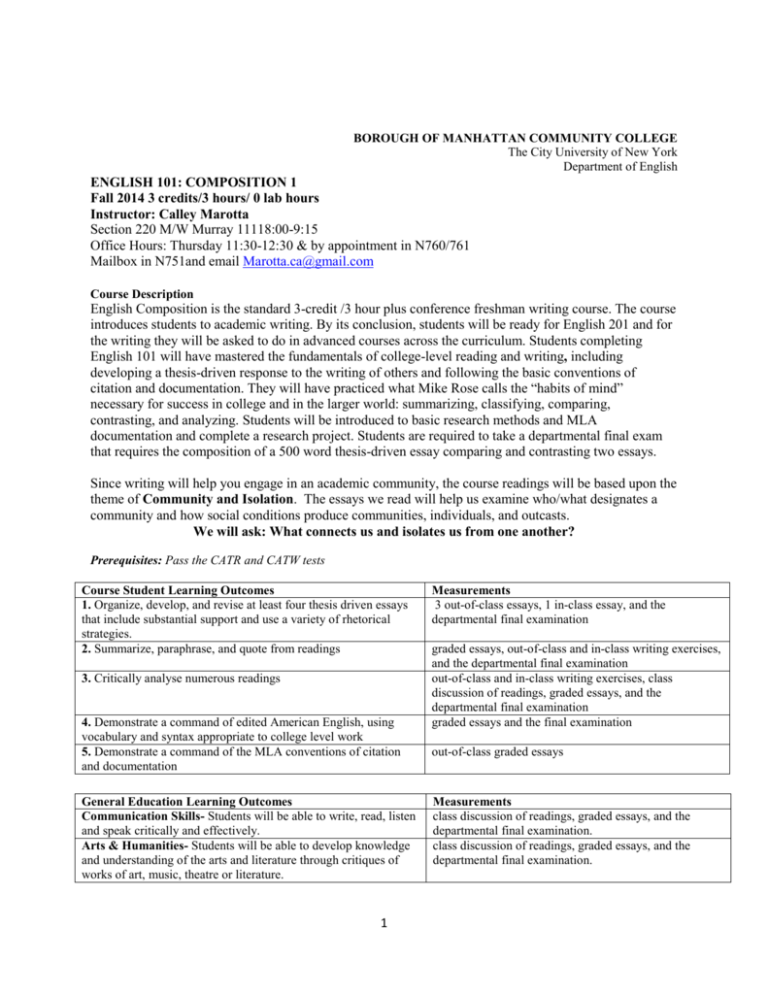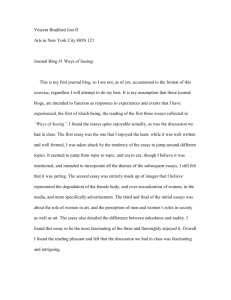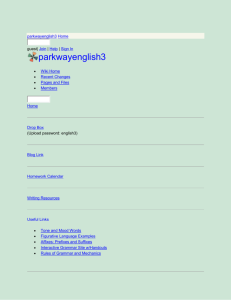ENG 101 Course_Syllabus_Fall_2014_Marotta__updated
advertisement

BOROUGH OF MANHATTAN COMMUNITY COLLEGE The City University of New York Department of English ENGLISH 101: COMPOSITION 1 Fall 2014 3 credits/3 hours/ 0 lab hours Instructor: Calley Marotta Section 220 M/W Murray 11118:00-9:15 Office Hours: Thursday 11:30-12:30 & by appointment in N760/761 Mailbox in N751and email Marotta.ca@gmail.com Course Description English Composition is the standard 3-credit /3 hour plus conference freshman writing course. The course introduces students to academic writing. By its conclusion, students will be ready for English 201 and for the writing they will be asked to do in advanced courses across the curriculum. Students completing English 101 will have mastered the fundamentals of college-level reading and writing, including developing a thesis-driven response to the writing of others and following the basic conventions of citation and documentation. They will have practiced what Mike Rose calls the “habits of mind” necessary for success in college and in the larger world: summarizing, classifying, comparing, contrasting, and analyzing. Students will be introduced to basic research methods and MLA documentation and complete a research project. Students are required to take a departmental final exam that requires the composition of a 500 word thesis-driven essay comparing and contrasting two essays. Since writing will help you engage in an academic community, the course readings will be based upon the theme of Community and Isolation. The essays we read will help us examine who/what designates a community and how social conditions produce communities, individuals, and outcasts. We will ask: What connects us and isolates us from one another? Prerequisites: Pass the CATR and CATW tests Course Student Learning Outcomes 1. Organize, develop, and revise at least four thesis driven essays that include substantial support and use a variety of rhetorical strategies. 2. Summarize, paraphrase, and quote from readings 3. Critically analyse numerous readings 4. Demonstrate a command of edited American English, using vocabulary and syntax appropriate to college level work 5. Demonstrate a command of the MLA conventions of citation and documentation General Education Learning Outcomes Communication Skills- Students will be able to write, read, listen and speak critically and effectively. Arts & Humanities- Students will be able to develop knowledge and understanding of the arts and literature through critiques of works of art, music, theatre or literature. 1 Measurements 3 out-of-class essays, 1 in-class essay, and the departmental final examination graded essays, out-of-class and in-class writing exercises, and the departmental final examination out-of-class and in-class writing exercises, class discussion of readings, graded essays, and the departmental final examination graded essays and the final examination out-of-class graded essays Measurements class discussion of readings, graded essays, and the departmental final examination. class discussion of readings, graded essays, and the departmental final examination. Information & Technology Literacy- Students will be able to collect, evaluate and interpret information and effectively use information technologies. Values- Students will be able to make informed choices based on an understanding of personal values, human diversity, multicultural awareness and social responsibility. blog posts and research for essays graded essays in response to course theme of community and isolation *This is a Pathways Course CUNY COMMON CORE Location Please check below the area of the Common Core for which the course is being submitted. (Select only one.) Required English Composition Mathematical and Quantitative Reasoning Life and Physical Sciences Flexible World Cultures and Global Issues US Experience in its Diversity Creative Expression Individual and Society Scientific World Learning Outcomes In the left column explain the assignments and course attributes that will address the learning outcomes in the right column. English Composition: Six credits A course in this area must meet all the learning outcomes in the right column. A student will: Example: Students will write thesis driven papers, research papers, blogs entries, informal journal entries, oral presentations or Blackboard discussion groups that identify arguments and major assumptions and evaluate supporting evidence and contexts in texts by various writers such as Plato, King, Emerson, Walker, and Anzaldua Students will write thesis driven papers, research papers, blogs entries, informal journal entries and/or blackboard discussion board entries. Students will produce multiple drafts of each required paper. Students will engage in peer review sessions and provide written feedback to others’ writings. Students will conduct primary and secondary research using the library and college on-line databases. Students will write annotated bibliographies evaluating the sources they found and/or write research papers that synthesize the primary and secondary sources they evaluated Students will write thesis driven papers, research papers, and/or oral presentations that support a thesis with well-reasoned arguments using research and utilizing various technology to support a persuasive argument. For example, a student may write an essay comparing educational theories in Plato’s Allegory of the Cave and Malcolm X’s “Learning to Read.” Students will write thesis driven research papers that support an original thesis about various texts covered in the course. Students will support their Read and listen critically and analytically, including identifying an argument's major assumptions and assertions and evaluating its supporting evidence. Write clearly and coherently in varied, academic formats (such as formal essays, research papers, and reports) using standard English and appropriate technology to critique and improve one's own and others' texts. Demonstrate research skills using appropriate technology, including gathering, evaluating, and synthesizing primary and secondary sources. Support a thesis with well-reasoned arguments, and communicate persuasively across a variety of contexts, purposes, audiences, and media. Formulate original ideas and relate them to the ideas of others by employing the conventions of ethical attribution and citation. 2 arguments using documented and cited primary and secondary sources, utilizing conventions of MLA ethical attribution and citation. For example, a student may write an essay comparing educational theories in Plato’s Allegory of the Cave and Malcolm X’s “Learning to Read” that would include in-text citations and a Works Cited list. Required Texts and Materials Please purchase 50 Essays: A Portable Anthology (Third Edition) by Samuel Cohen. This text is available at the BMCC bookstore. Please bring this text to every class in addition to any other required readings that I copy and distribute in class. Take notes in an 8 x 10 notebook and organize papers in a folder. You will need a college level dictionary for the final and practice exam. Course Requirements Out of Class Work 3 out-of-class essays graded as drafts/ able to be revised Assigned readings to be completed before class 1 blog due before class or handed in during class (see blog sheet) In-Class Work Informal writing including group work 1 practice essay for the final exam Participation is a part of your grade because you will learn through thinking and talking as well as writing. In order to receive the maximum credit you must: Be prepared to speak about the readings or writing skills at least once each class. You can ask a question or share a comment with the class, or you can ask a follow-up question to another student. Please refer to other students by name, look at the person sharing, and put your hand down while other people are speaking. Please raise your hand and wait to be called on and do not call out unless you are instructed. I will be asking you to read aloud and may even call on you when your hand is not up. I never call on students to punish them or catch them doing something wrong, I call on 3 students to move the class along so we can all learn as much as possible. Please support your fellow students by showing them respect and recognizing their hard work. Departmental Final Exam You will compose, draft and edit a thesis-centered essay of at least 500 words. Class Preparation Bring readings marked with notes. (see sheet) It may also be helpful to take notes in an organizer (discussed second class). Read the texts more than once if possible. Complete blog post including your discussion question. Writing the blog post and reading other students’ posts will also help you understand the readings. Handing in Graded Assignments Essays will be handed-in in class by the deadline. I will not accept assignments over email. If you miss the deadline, I still want your paper, but it is ineligible from receiving the highest grade. If you miss the deadline---don’t miss class, hand the essay into my mailbox. 4 CLASSROOM ETIQUETTE Attendance and Punctuality Attend every class on time. More than 2 absences may affect your grade and more than 4 hours (not classes) missed may result in a failing grade. If you know that you will need to miss class, please let me know ahead of time (though this does not excuse your absence). If you are late, please enter quietly and take the nearest seat so as not to disturb others. You are responsible for any work assigned during an absence. If you miss class, contact me via email and ask another student to lend you their notes. Electronics The college’s policy is that cell phones and electronic equipment must be off and stored away during class. If you use assistive technology as a part of an accommodation, please talk to me and we will make arrangements for you to use it. This is a Classroom Committed to Accessibility: Please let me know if there are ways that I can make it easier for you to learn. If the seating arrangement, sound in the classroom, or anything else is preventing you from doing your best work, contact me and we work together to solve the problem. Students with disabilities who require accommodations, please contact the Office of Accessibility and they will prepare the documents I need in order to arrange accommodations on assessments. BMCC is committed to providing equal access to all programs and curricula to all students. Extra Resources I would like to meet with everyone at least once this semester. I will bring a sign-up sheet for office hours to every class so that you can sign up. You don’t need a specific reason to come and talk to me, but it will benefit you to bring a written idea or work to discuss. The Learning Resource Center offers free tutoring for English students. Please show them our class work so that the tutors understand what we having been doing in class. I may ask you to go to the Center. If you go on your own and bring me a note saying you attended a tutoring session, you will receive extra credit. BMCC Policy on Plagiarism and Academic Integrity Statement. Plagiarism is the presentation of someone else’s ideas, words or artistic, scientific or technical work as one’s own creation. Using the idea or work of another is permissible only when the original author is identified. Paraphrasing and summarizing, as well as direct quotations, require citations to the original source. Plagiarism may be intentional or unintentional. Lack of dishonest 5 intent does not necessarily absolve a student of responsibility for plagiarism. Students who are unsure how and when to provide documentation are advised to consult with their instructors. The library has guides designed to help students to appropriately identify a cited work. The full policy can be found on BMCC’s web site, www.bmcc.cuny.edu. We will discuss this more in class---It is not a silly question to ask about what qualifies as plagiarism. Just don’t do it! Grading Essays 1 Essay 2 Essay 3 Essay 4 Informal Writing (blog posts, class/group work) Class Participation Departmental Final Exam 10% 10% 10% 10% 15% 15% 30% Tentative Schedule (subject to change according to student needs) Date Reading/Writing Topic W 9/3 Introductions M 9/8 How an Essay Works Identifying Claims “They Say/I Say” Reading for Class Excerpts from Outliers Malcolm Gladwell; Practice Doug LeMov Writing for Class First Blog Post Incarceration W 9/10 Responding to Claims with Strong Claims “They Say/I Say” “Letter from Birmingham Jail” Martin Luther King (first half) Blog Post M 9/15 Writing Introductions with Strong Claims “Letter from Birmingham Jail” Martin Luther King continued “Closing Statements” Maria Alyokhina (handout) Blog Post Essay 1 Assigned: Photo Essay W 9/17 Supporting Claims with Evidence “Learning to Read” Malcolm X Blog Post M 9/22 Excerpts from Asylums Erving Goffman (hand out) Blog Post *Bring Draft Photo and Captions W 9/24 NO CLASS 6 Urban Landscapes M 9/29 Strong Claims and Reasons Getting to your claim through your reasons W 10/1 Claims and Evidence writing body paragraphs with a point M 10/6 Types of Evidence W 10/8 Source Based Paragraphs First Unit Reflections Deadline: Essay 1 with stapled draft “How Not to be Alone” Jonathan Safran Foer (handout) started in class “TV: The Plug in Drug” Marie Winn Anti-Blog Post (argue against what you really think for the “I Say”) Blog Post Essay 2 Assigned “The End of 5 Pointz” New York Times article (handout) Blog Post *Do a Grafitti “Walking Tour” Introduce Group Project M 10/13 W 10/15 NO CLASSES Outside research M 10/20 Group Graffiti Project using reliable research sources and supporting claims with evidence Summarizing a claim W 10/22 Backward Outlining “On Compassion” Ascher Blog Post “Broken Windows” Blog Post Deadline: Essay 2 with stapled draft M 10/27 Source-Based Paragraphs: choosing relevant quotations “Serving in Florida” Ehrenreich 7 Blog Post Essay 3 Assigned In/dependence in America W 10/29 Body paragraphs using point sentences “Declaration of Independence” (handout) Blog Post M 11/3 Creating Unity using key words “Declaration of Independence” (handout) Blog Post “The Lesson” (handout) Bambara Bring 2 copies of a draft Blog Post Mythologies excerpts Bring 2 copies of a draft Blog Post W 11/5 M 11/10 Writing Clear Sentences proof reading strategies Writing Clear Sentences subjects and verbs W 11/12 Explaining Evidence using connectors and transitions “In Search of Our Mother’s Gardens” Alice Walker and excerpt from “A Room of One’s Own” Virginia Woolf (handout) M 11/17 Compare and Contrast finding similarities and differences in claims “On Being a Cripple” Nancy Mairs with excerpts from Rose Marie Garland Thompson reading (handout) Essay 3 Due with stapled draft Blog Post Blog Post Nation W 11/19 TBA “Mother Tongue” Amy Tan Blog Post M 11/24 TBA David Simon Blog Post Essay 4: In Class Practice Exam Blog Post Blog Post W 11/26 M 12/1 Final Review “Borderlands” Anzaldua W 12/3 Final Review “Borderlands” Anzaldua M 12/8 Final Review TBA W 12/10 Final Exam in class 8 9



